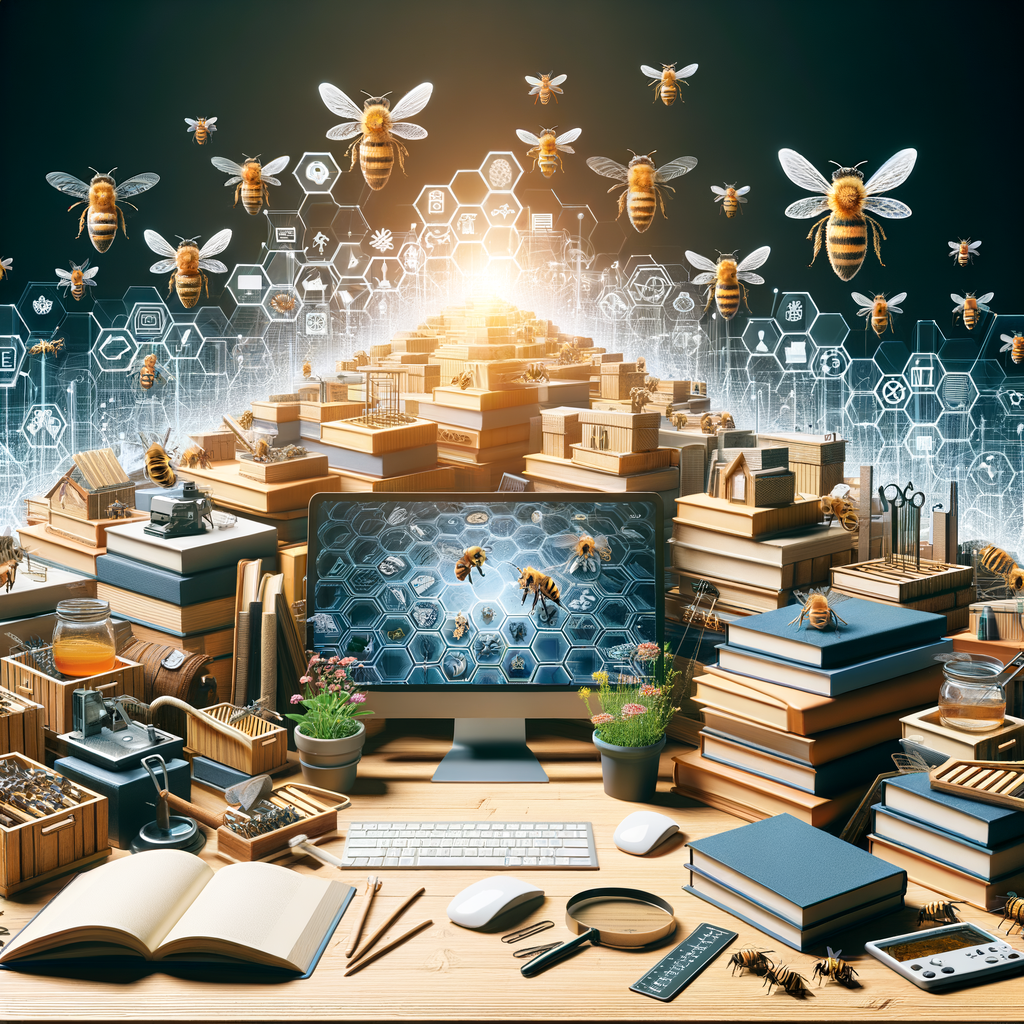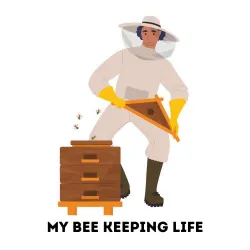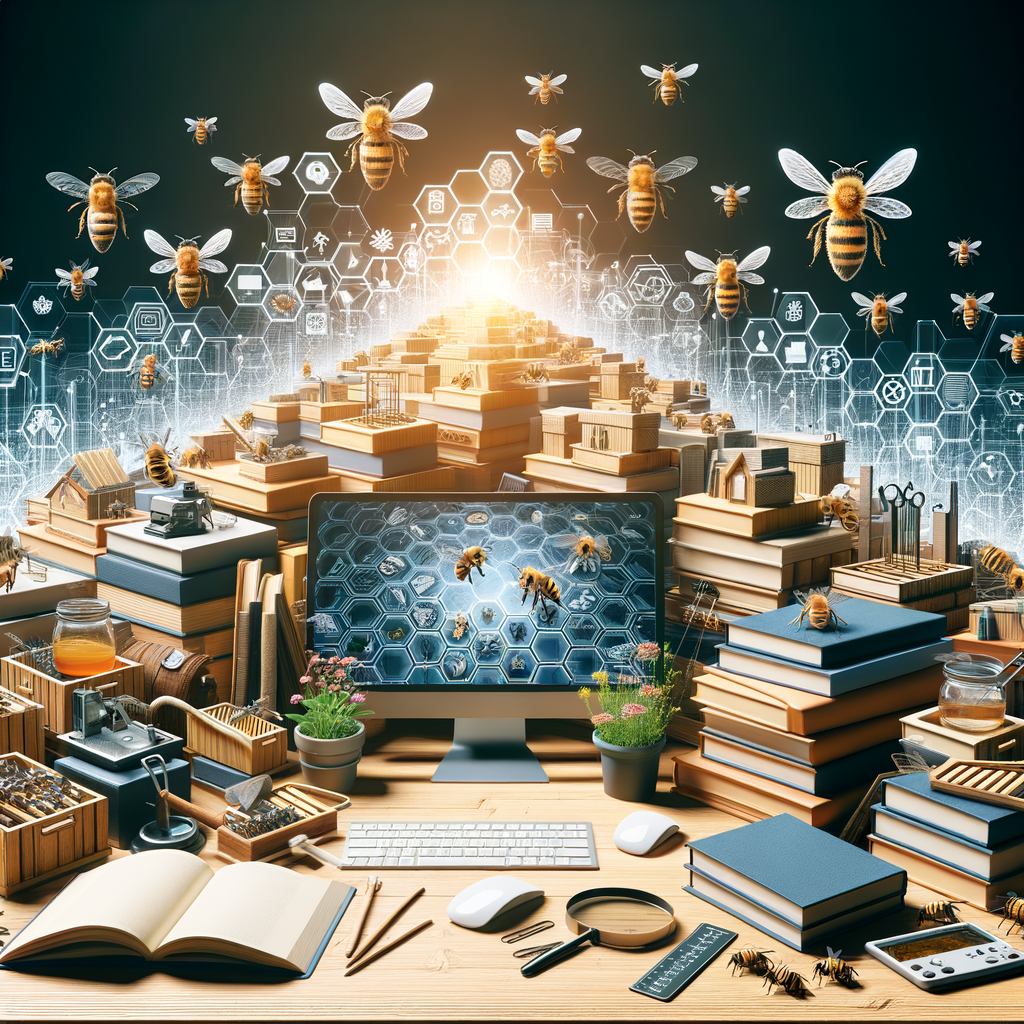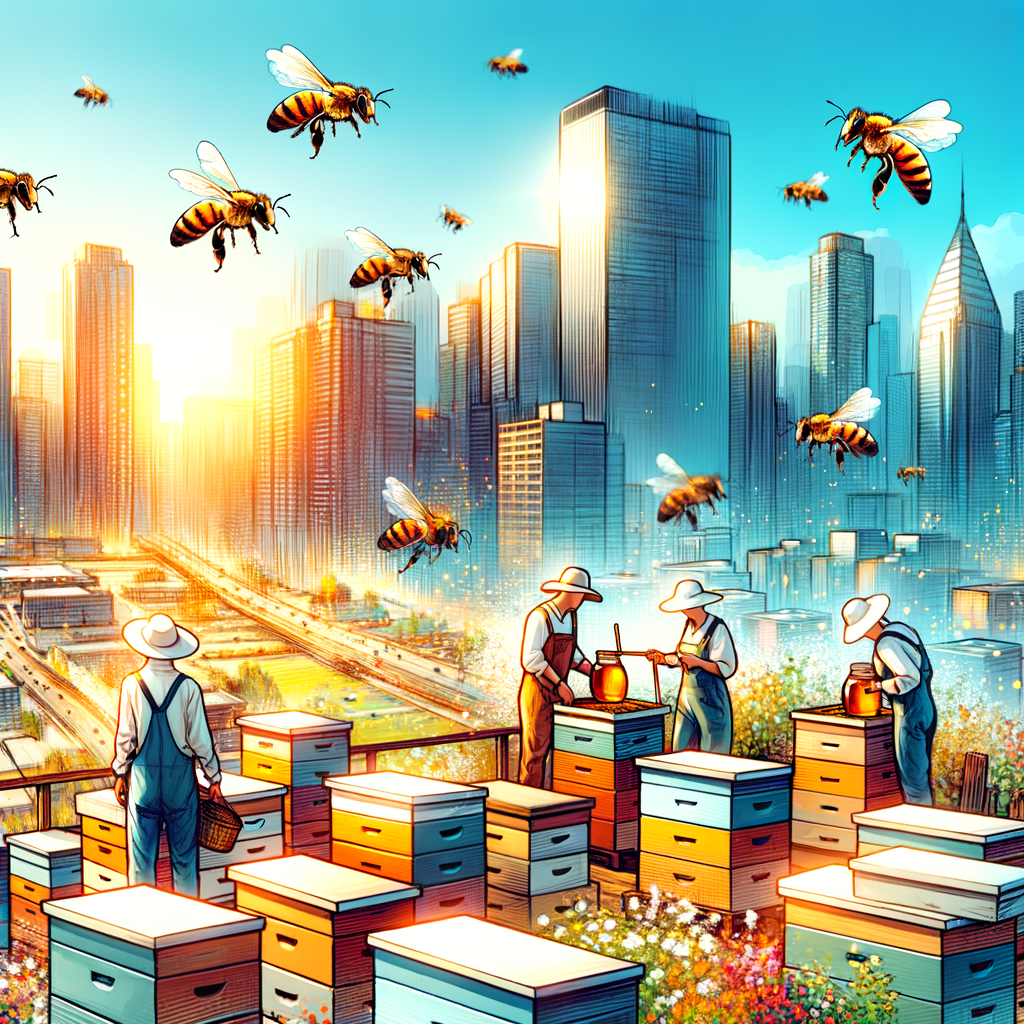
Introduction to Beekeeping Mastery
Welcome to the world of beekeeping! This fascinating hobby is not just about producing honey, but also about learning and mastering the art of caring for bees. It’s a journey that requires continuous education and improvement. Let’s dive into the importance of learning and what this article will cover.
-
- The Importance of Continuous Beekeeping Education
Just like any other skill, beekeeping requires continuous learning. The world of bees is complex and ever-changing. New research, techniques, and challenges emerge regularly. By continuously educating yourself, you can stay ahead of these changes and ensure the health and productivity of your bees. This continuous learning is the key to beekeeping mastery.
-
- Overview of the Article
This article is designed to guide you on your journey to beekeeping mastery. We will explore various resources for continuous learning, discuss ways to improve your beekeeping techniques, and delve into the importance of beekeeping education and training. We will also share inspiring case studies of beekeepers who have significantly improved their skills and outcomes. By the end of this article, you will have a clear path towards achieving beekeeping mastery.
So, let’s embark on this exciting journey together. Remember, the path to mastery is not a sprint, but a marathon. With patience, persistence, and continuous learning, you can become a master beekeeper.
Beekeeping Resources for Continuous Learning
As a beekeeper, your education never ends. There are always new techniques to learn, fresh insights to gain, and innovative practices to implement. One of the best ways to continue your learning journey is through books and publications. Let’s explore some of the top resources in these categories.
Books and Publications
Books and publications are invaluable resources for beekeepers. They offer a wealth of knowledge from experts who have spent years studying and practicing beekeeping. Here are some top picks:
-
- Top books for advanced beekeeping
For those who have mastered the basics and are ready to take their beekeeping skills to the next level, advanced beekeeping books are a great resource. These books delve into complex topics like queen rearing, disease management, and maximizing honey production. Some top-rated books in this category include “The Beekeeper’s Handbook” by Diana Sammataro and “Honey Bee Biology and Beekeeping” by Dewey M. Caron.
-
- Relevant publications for beekeeping best practices
Staying updated with the latest research and best practices in beekeeping is crucial for success. Publications like “American Bee Journal” and “Bee Culture Magazine” offer a wealth of information on topics like hive management, bee health, and the latest research in apiculture. These publications often feature articles from leading experts in the field, making them a must-read for any serious beekeeper.
Remember, continuous learning is the key to beekeeping mastery. By regularly reading and learning from these books and publications, you can stay at the forefront of beekeeping knowledge and practices. This will not only help you become a better beekeeper but also ensure the health and productivity of your bees.
Online Resources
Just like any other field, beekeeping also has a wealth of resources available online. These resources can provide you with a plethora of information, tips, and tricks to help you master beekeeping. Let’s explore some of the best ones.
-
- Best Websites for Beekeeping Tips
There are numerous websites dedicated to providing beekeeping tips. These websites are run by experienced beekeepers and experts who share their knowledge and experiences. They offer a wide range of information, from the basics of beekeeping to advanced techniques and strategies. Some of the best websites include:
-
-
- Beekeeping Mastery: This website offers a comprehensive guide to beekeeping, including tips on hive management, honey extraction, and bee health.
- The Beekeeper’s Journal: This blog provides practical advice and insights from a seasoned beekeeper. It also features a forum where beekeepers can share their experiences and ask questions.
- Beekeeping World: This website offers a wealth of resources, including articles, videos, and tutorials on various aspects of beekeeping.
- Online Forums for Beekeeping Discussions
-
Online forums are a great place to connect with other beekeepers, ask questions, and share experiences. These forums are often filled with seasoned beekeepers who are more than willing to share their knowledge and help beginners. Some of the most popular beekeeping forums include:
-
- Beekeeping Forum: This is one of the largest online communities for beekeepers. It covers a wide range of topics, from beginner’s guides to advanced beekeeping techniques.
- The Hive Mind: This forum is a great place to discuss all things beekeeping. It features sections on bee health, honey production, and hive management.
- Beekeepers’ Corner: This forum is a great place for beginners to ask questions and get advice from experienced beekeepers.
Remember, the journey to beekeeping mastery is a continuous learning process. Utilize these online resources to keep improving your skills and knowledge. Happy beekeeping!
Improving Beekeeping Techniques
Improving your beekeeping skills is a continuous journey. It involves learning new techniques, mastering them, and applying them effectively. In this section, we will delve into some advanced beekeeping techniques that can help you take your beekeeping practice to the next level.
Advanced Beekeeping Techniques
Advanced beekeeping techniques are methods that experienced beekeepers use to increase their honey production, improve the health of their bees, and ensure the sustainability of their beekeeping practices. Let’s explore two of these techniques:
- Mastering the art of queen rearing: The queen bee plays a crucial role in the hive. She is responsible for laying eggs and maintaining the hive’s population. Mastering the art of queen rearing involves understanding the queen’s lifecycle, knowing when to replace her, and learning how to raise new queens. This skill can significantly improve the health and productivity of your hive.
- Advanced techniques for honey extraction: Extracting honey is a delicate process that requires care and precision. Advanced techniques involve using specialized equipment to extract honey without damaging the honeycombs or disturbing the bees. These techniques can help you increase your honey yield and ensure the longevity of your hive.
By mastering these advanced beekeeping techniques, you can improve your beekeeping practices and increase your honey production. Remember, the key to successful beekeeping is continuous learning and improvement. So, don’t stop exploring and experimenting with new techniques and methods.
Beekeeping Best Practices
As a beekeeper, your main goal is to ensure that your bees are healthy and productive. This involves a combination of effective hive management and sustainable beekeeping practices. Let’s delve into these two key areas.
- Effective Hive Management
Effective hive management is crucial for the health and productivity of your bees. It involves regular inspections to monitor the health of the queen, the presence of brood, and the overall condition of the hive. Here are some best practices:
| Best Practices | Description |
|---|---|
| Regular Inspections | Inspect your hive every 7-10 days during the active season to check for signs of disease or pests. |
| Queen Health | Ensure the queen is laying eggs and the hive is producing brood. If not, you may need to replace the queen. |
| Hive Cleanliness | Keep the hive clean and free from debris to prevent disease and pests. |
- Sustainable Beekeeping Practices
Sustainable beekeeping practices aim to maintain the health of the bee population and the environment. Here are some sustainable practices you can adopt:
| Best Practices | Description |
|---|---|
| Plant Diversity | Plant a variety of flowers to provide bees with a diverse diet, which can help improve their health and productivity. |
| Minimal Intervention | Avoid unnecessary interference with the hive. Let the bees do what they naturally do best. |
| Responsible Harvesting | Only harvest honey when there is a surplus. Bees need their honey for winter survival. |
By following these best practices, you can ensure the health and productivity of your bees while also contributing to the sustainability of the environment.
Beekeeping Education and Training
One of the key steps towards becoming a successful beekeeper is acquiring the right education and training. This section will guide you through the best beekeeping courses available online and on-site.
Beekeeping Courses
Whether you’re a beginner or an experienced beekeeper looking to hone your skills, there are a variety of courses available. These courses offer comprehensive training on beekeeping techniques, hive management, and honey production.
-
- Top online courses for beekeeping
Online courses offer flexibility and convenience, allowing you to learn at your own pace. Here are some top-rated online beekeeping courses:
| Course Name | Description |
|---|---|
| Beekeeping Basics | This course offers a comprehensive introduction to beekeeping, covering topics such as bee biology, hive management, and honey extraction. |
| Advanced Beekeeping Techniques | Designed for experienced beekeepers, this course delves into advanced topics like queen rearing, disease management, and sustainable beekeeping practices. |
-
- On-site training programs for beekeepers
On-site training provides hands-on experience, allowing you to learn directly from experts in the field. Here are some highly recommended on-site training programs:
| Program Name | Description |
|---|---|
| Beekeeping Apprenticeship Program | This program offers practical training in beekeeping, including hive inspection, honey harvesting, and bee health monitoring. |
| Master Beekeeper Certification Program | This intensive program provides advanced training in beekeeping and prepares you for the Master Beekeeper certification exam. |
Whether you choose online or on-site training, remember that continuous learning is key to mastering beekeeping. So, start your beekeeping education today and take a step closer to becoming a beekeeping expert.
Workshops and Seminars
Workshops and seminars are a great way to learn more about beekeeping. They provide hands-on experience and the opportunity to learn from experts in the field. Let’s take a look at some upcoming workshops and key takeaways from recent seminars.
- Upcoming Beekeeping Workshops
There are several upcoming workshops that can help you improve your beekeeping skills. Here are a few to consider:
| Workshop | Date | Location |
|---|---|---|
| Honey Harvesting Techniques | June 15, 2023 | Online |
| Advanced Beekeeping Strategies | July 20, 2023 | New York, NY |
| Bee Health and Disease Management | August 10, 2023 | Online |
- Key Takeaways from Recent Beekeeping Seminars
There have been several informative seminars on beekeeping recently. Here are some of the key takeaways:
- Importance of Regular Hive Inspections: Regular inspections can help identify any potential issues early and keep your bees healthy.
- Effective Pest Control Strategies: Using natural methods to control pests can protect your bees and increase honey production.
- Benefits of Local Plant Species: Planting local species can provide a rich and diverse diet for your bees, improving their health and honey quality.
Attending workshops and seminars is a great way to continue your beekeeping education. They offer valuable insights and practical tips that can help you become a more successful beekeeper.
Case Studies: Beekeeping Improvement in Action
Let’s delve into some real-life examples that demonstrate the power of advanced techniques and continuous learning in beekeeping.
-
Case Study 1: Successful Implementation of Advanced Beekeeping Techniques
In a small town in Minnesota, a group of beekeepers decided to experiment with advanced techniques. They introduced a new type of hive, known as the ‘Langstroth hive’, which is designed to maximize honey production.
After a year of using these hives, the beekeepers reported a 25% increase in honey production. Not only that, but the health of the bee colonies also improved significantly. The beekeepers attributed this success to the use of advanced techniques and the Langstroth hive’s design.
This case study demonstrates the potential benefits of embracing advanced beekeeping techniques. It shows that with the right tools and methods, beekeepers can increase their productivity and contribute to the health and sustainability of bee populations.
-
Case Study 2: The Impact of Continuous Learning on Beekeeping
In Oregon, a beekeeper named Sarah decided to invest in her education. She enrolled in a beekeeping course and began to apply what she learned to her own hives.
Within six months, Sarah saw a 20% increase in honey production and a decrease in colony losses. She attributed her success to the knowledge she gained from the course and her commitment to continuous learning.
This case study highlights the importance of education and continuous learning in beekeeping. By staying informed and up-to-date, beekeepers can improve their practices, increase their productivity, and better care for their bees.
In addition, these case studies show that with the right techniques and a commitment to learning, beekeepers can greatly improve their practices. Whether you’re a beginner or an experienced beekeeper, there’s always room for improvement and growth in the world of beekeeping.
Conclusion: The Journey to Beekeeping Mastery
As we conclude our exploration of beekeeping mastery, it’s important to remember that the journey to becoming a master beekeeper is not a destination, but a continuous process of learning and improvement. Let’s recap the key points and discuss the next steps on your journey.
-
- Recap of the importance of ongoing beekeeping improvement:
Beekeeping mastery is not a one-time achievement. It requires a commitment to ongoing learning and improvement. As we have seen in the case studies, even the most experienced beekeepers continue to learn and adapt their techniques. They understand that the world of bees is ever-changing and that they must adapt to keep up. This ongoing improvement is not only beneficial for the bees but also for the beekeeper. It leads to increased honey production, healthier bees, and a more rewarding beekeeping experience.
-
- Final thoughts and next steps for the reader:
As you continue on your journey to beekeeping mastery, remember to utilize the resources and techniques we’ve discussed. Seek out education and training opportunities, and don’t be afraid to try new methods. Remember, every mistake is a learning opportunity. And most importantly, enjoy the journey. Beekeeping is not just about the destination of mastery, but about the joy and satisfaction you gain along the way.
Thank you for joining us on this journey. We hope you found this information helpful and that it inspires you to continue your pursuit of beekeeping mastery. Remember, the world of bees is waiting for you. Happy beekeeping!








